Hyundai i30 Wagon vs Kia Ceed Sportswagon - Differences and prices compared
Compare performance (140 HP vs 140 HP), boot space and price (24800 £ vs 24300 £ ) at a glance. Find out which car is the better choice for you – Hyundai i30 Wagon or Kia Ceed Sportswagon?
Costs and Efficiency:
When it comes to price and running costs, the biggest differences usually appear. This is often where you see which car fits your budget better in the long run.
Kia Ceed Sportswagon has a slight advantage in terms of price – it starts at 24300 £ , while the Hyundai i30 Wagon costs 24800 £ . That’s a price difference of around 514 £.
Fuel consumption also shows a difference: Hyundai i30 Wagon manages with 5.70 L and is therefore hardly perceptible more efficient than the Kia Ceed Sportswagon with 6 L. The difference is about 0.30 L per 100 km.
Engine and Performance:
Power, torque and acceleration are the classic benchmarks for car enthusiasts – and here, some clear differences start to show.
Both models deliver identical power – 140 HP each.
In acceleration from 0 to 100 km/h, the Kia Ceed Sportswagon is hardly perceptible quicker – completing the sprint in 9.70 s, while the Hyundai i30 Wagon takes 9.80 s. That’s about 0.10 s faster.
There’s no difference in top speed – both reach 197 km/h.
Both models offer the same torque – 253 Nm.
Space and Everyday Use:
Cabin size, boot volume and payload all play a role in everyday practicality. Here, comfort and flexibility make the difference.
Both vehicles offer seating for 5 people.
In curb weight, Hyundai i30 Wagon is slight lighter – 1316 kg compared to 1335 kg. The difference is around 19 kg.
In terms of boot space, the Kia Ceed Sportswagon offers barely noticeable more room – 625 L compared to 602 L. That’s a difference of about 23 L.
In maximum load capacity, the Hyundai i30 Wagon performs minimal better – up to 1650 L, which is about 105 L more than the Kia Ceed Sportswagon.
When it comes to payload, Hyundai i30 Wagon barely noticeable takes the win – 524 kg compared to 485 kg. That’s a difference of about 39 kg.
Who wins the race?
The Hyundai i30 Wagon proves to be has a very small edge and therefore becomes our DriveDuel Champion!
Hyundai i30 Wagon is the better all-rounder in this comparison.
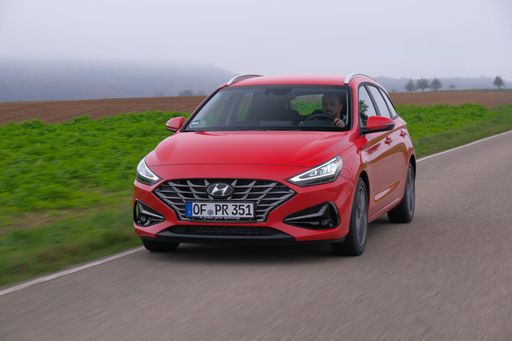
Hyundai i30 Wagon
Costs and Consumption
View detailed analysis
Engine and Performance
View detailed analysis
Dimensions and Body
View detailed analysis
Hyundai i30 Wagon
The Hyundai i30 Wagon is a practical family hauler that pairs roomy, sensible packaging with clean, modern lines and a surprisingly composed chassis. Comfortable, well-equipped and priced to make rivals sweat, it quietly ticks the boxes for daily life and weekend escapes while still managing a little grin on twisty roads.
details
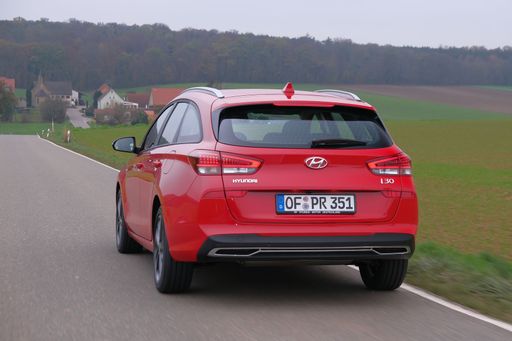
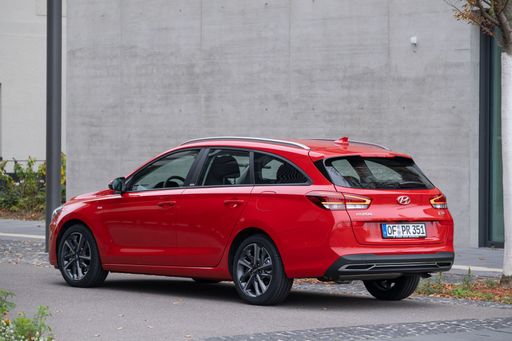
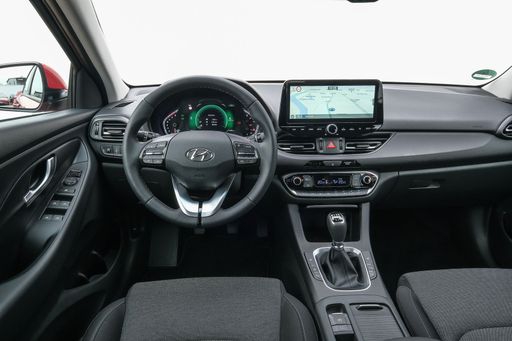
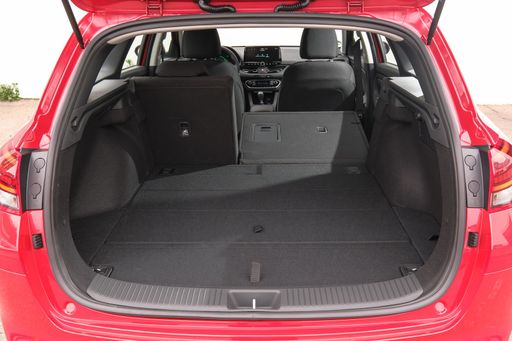
Kia Ceed Sportswagon
The Kia Ceed Sportswagon is a sensible and surprisingly stylish family wagon that turns daily chores into a bit less of a grind. Practical, comfortable and packed with thoughtful touches where they matter, it’s a smart choice for buyers who want usefulness without sacrificing personality.
details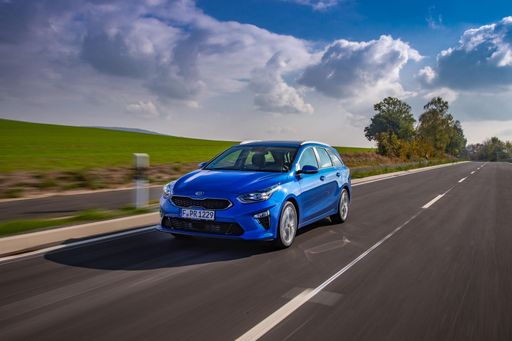
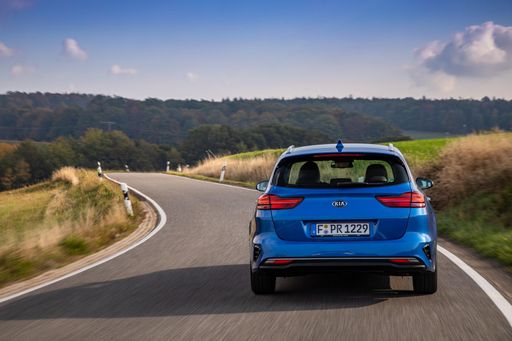
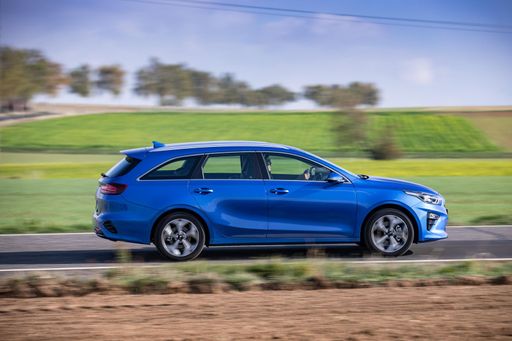
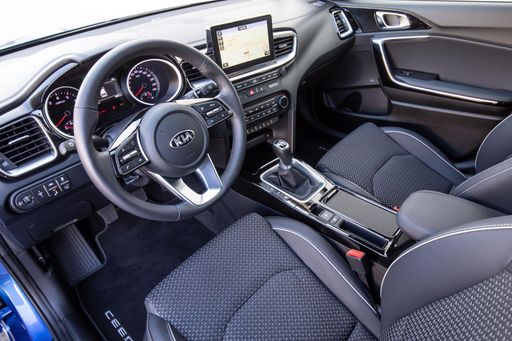
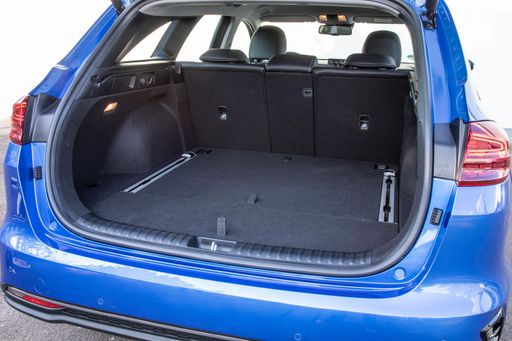
Costs and Consumption |
|
|---|---|
|
Price
24800 - 30100 £
|
Price
24300 - 29100 £
|
|
Consumption L/100km
5.7 - 6 L
|
Consumption L/100km
6 - 6.4 L
|
|
Consumption kWh/100km
-
|
Consumption kWh/100km
-
|
|
Electric Range
-
|
Electric Range
-
|
|
Battery Capacity
-
|
Battery Capacity
-
|
|
co2
130 - 136 g/km
|
co2
137 - 146 g/km
|
|
Fuel tank capacity
50 L
|
Fuel tank capacity
50 L
|
Dimensions and Body |
|
|---|---|
|
Body Type
Estate
|
Body Type
Estate
|
|
Seats
5
|
Seats
5
|
|
Doors
5
|
Doors
5
|
|
Curb weight
1316 - 1461 kg
|
Curb weight
1335 - 1437 kg
|
|
Trunk capacity
602 L
|
Trunk capacity
512 - 625 L
|
|
Length
4585 mm
|
Length
4605 mm
|
|
Width
1795 mm
|
Width
1800 mm
|
|
Height
1475 mm
|
Height
1422 mm
|
|
Max trunk capacity
1650 L
|
Max trunk capacity
1545 L
|
|
Payload
439 - 524 kg
|
Payload
455 - 485 kg
|
Engine and Performance |
|
|---|---|
|
Engine Type
Petrol, Petrol MHEV
|
Engine Type
Petrol, Petrol MHEV
|
|
Transmission
Manuel, Automatic
|
Transmission
Automatic, Manuel
|
|
Transmission Detail
Manual Gearbox, Dual-Clutch Automatic
|
Transmission Detail
Dual-Clutch Automatic, Manual Gearbox
|
|
Drive Type
Front-Wheel Drive
|
Drive Type
Front-Wheel Drive
|
|
Power HP
100 - 140 HP
|
Power HP
100 - 140 HP
|
|
Acceleration 0-100km/h
9.8 - 13.3 s
|
Acceleration 0-100km/h
9.7 - 13.5 s
|
|
Max Speed
178 - 197 km/h
|
Max Speed
197 km/h
|
|
Torque
172 - 253 Nm
|
Torque
172 - 253 Nm
|
|
Number of Cylinders
3 - 4
|
Number of Cylinders
3 - 4
|
|
Power kW
74 - 103 kW
|
Power kW
74 - 103 kW
|
|
Engine capacity
998 - 1482 cm3
|
Engine capacity
998 - 1482 cm3
|
General |
|
|---|---|
|
Model Year
2024
|
Model Year
2024
|
|
CO2 Efficiency Class
D, E
|
CO2 Efficiency Class
E
|
|
Brand
Hyundai
|
Brand
Kia
|
What drivetrain options does the Hyundai i30 Wagon have?
Available configurations include Front-Wheel Drive.




